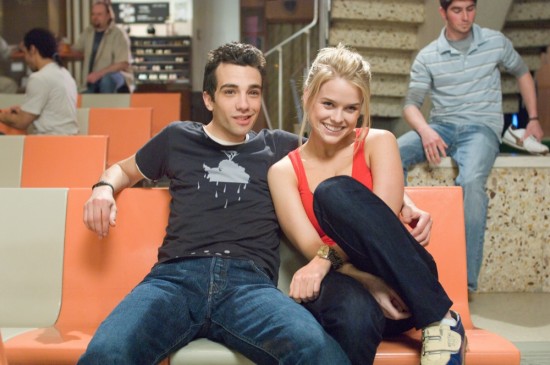She’s Out of My League
Posted on June 22, 2010 at 8:35 am
“She’s Out of My League” recognizes that raunchiness is easy, but sweetness is the challenge. Making both parts of the equation work is something of a struggle but this movie comes closer than many.
The title says it all, and the mismatch of tone parallels the mismatch in the story. It’s a gender-reversed Cinderella story about a shlub who loves a goddess. And he has no idea what to do when it appears that she might just like him back. He cannot believe that he deserves her, and so of course he then does everything he can think of to prove he’s right by making the near-fatal mistake of taking the advice of his friends. The definitive response to this, of course, is still the scene in “Say Anything,” the quintessential she’s out of my league movie, where John Cusack responds to his friends’ awful advice: “If you guys know so much about women, how come you’re here at like the Gas ‘n’ Sip on a Saturday night completely alone drinking beers with no women anywhere?” Apparently, Kirk (Jay Baruchel of “Tropic Thunder” and “Nick and Nora’s Infinite Playlist”) never saw that movie because when one of his friends tells him that the way to a woman’s heart is to engage in an extreme makeover of a personal area, he goes for it all the way in an extended scene that somehow — see above — manages to become kind of sweet.

A lot of the credit goes to Baruchel, in his first romantic lead, as Kirk, the TSA security guy who works at the airport so he can dream of becoming a pilot, and Alice Eve as Molly, the impossibly beautiful dream girl who also happens to be smart, successful, kind-hearted, and able to somehow see more in Kirk than anyone else ever has. They never lose sight of the fact that this has to work as a romance as well as an over-the-top outrageous comedy, and that helps carry the audience through the slow patches. Unfortunately, it doesn’t to much to get us through the excruciating patches in which Kirk is subjected to a series of humiliating events, many featuring his embarrassingly obnoxious family and ex-girlfriend as well as various drawn-out mess-ups and recoveries and confrontations, ending, finally, in the inevitable race through the airport for a movie that never makes it off the ground.

